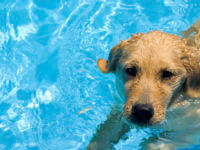Does your pet have itchy, watery eyes? Is she coughing and sneezing for no apparent reason? Is your indoor only cat scratching and biting or obsessively licking himself? This year we are experiencing record pollen counts in the DFW Metroplex and these airborne antigens are affecting not only humans but also our canine and feline companions.
Just as we have not yet found a cure for the common cold, most Texas residents with allergies recognize that late summer and early fall is the time to stock up on their favorite and most effective antihistamine. Unfortunately, just like in us, sometimes daily administration of these over-the-counter medications is insufficient at providing relief. In addition many dogs (and sometimes cats) experience additional problems including trouble emptying their anal glands, ear infections and mild to severe skin infections (pyoderma) and hot spots. Skin infections arise when the skin surface barrier is broken by patients who are so pruritic that they develop obsessive licking, biting or chewing. This results in micro breaks in the dermal layers permitting normal surface bacteria access into the deeper tissue layers causing pustule formation and greater intensity of skin irritation stimulating the pet even more and creating a non-stop “itch cycle.”
So what can be done at this time of year to help pet’s cope? We try to alleviate the itch and other associated symptoms in several different ways, not just through medication alone. Human allergists recommend reducing exposure to antigens through a variety of means in addition to medication which in turn will help dampen down the immune system’s “over-reaction” to environmental pollens, dusts, molds, et cetera.
A few tips that you can immediately employ are as follows:
- Wipe down your pets spending any time out of doors with a damp cloth every time they come inside, or at the very least once daily in the evening, to remove any accumulated antigens. This is the equivalent of us putting our dirty clothes into a room for a laundry basket away from where we sleep to prevent continuous exposure and showering before bed. Our pets can’t take off their clothes so a daily wipe down can really help to reduce the surface skin exposure to pollens and this easy treatment can be of great benefit to dogs suffering grass allergies, manifesting their most intense licking and chewing episodes within a few hours of being outside. (Indoor only animals can also benefit from this practice as wiping down helps remove surface pollens, dust and other antigens that we bring into our homes on our clothing and our shoes to which they become exposed.)
- Once weekly bathing with a mild, oatmeal based or soothing medicated shampoo is ideal for a more thorough cleaning. (More frequent bathing is not recommended as this can strip the coat of its natural oils, drying out already irritated skin.)
- Clean weekly to bi-weekly in hot, soapy water and fully drying all pet bedding, leashes, collars or other accoutrements to drastically reduce allergens to which your pet is exposed.
- For patients with a history of ear infections, 1-2 times per week cleaning maintenance care using a drying agent can be of great benefit. (We recommend cleaning the ears after swimming or bathing to prevent ear infections associated with water left in the ear canal.)
- Patients exhibiting classic “scooting” behavior or licking/chewing of their tail head region often have anal gland issues and will benefit from periodic manual expression. For patients with ongoing difficulty expressing their glands, often adding fiber in the form of fresh pumpkin in their daily diets can help.
- Use over the counter antihistamines as a first line of therapy. Most pets require twice daily therapy to keep their symptoms under control.
In instances where pet owners are already doing all of the above and their companions are still miserable, a trip to the veterinarian is in order. Often the first next line of treatment includes the conservative use of steroids and, when ear or skin infections are present, oral and topical antibiotic therapy as well. We strongly urge all of our clients to be proactive. Don’t wait until your dog has an intense skin rash or a major ear infection before calling. Many times we can intervene early just by addressing clients’ questions over the phone. As with people, some of our patients have a really hard time at this time of the year. Some even have food allergies which further exacerbate their symptoms during high pollen season. For pets whose clinical symptoms cannot be alleviated with standard therapy, or whose allergies are so severe that chronic steroid use has been the only reliable means of providing relief, we offer complementary referrals to dermatologic specialists with whom we work closely in the Dallas Metroplex.
You only want the best for your pet; so do we.

